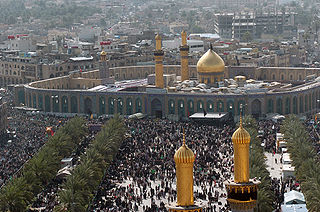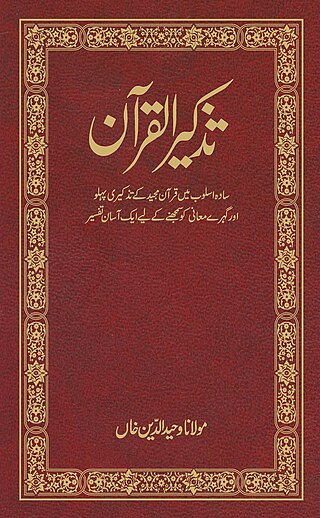
Seyyed Hossein Nasr is an Iranian philosopher, theologian and Islamic scholar. He is University Professor of Islamic studies at George Washington University.

Tawhid is the indivisible unification concept of monotheism in Islam. Tawhid is the religion's central and single most important concept, upon which a Muslim's entire religious adherence rests. It unequivocally holds that God is one and single.

Imāmah means "leadership" and is a concept in Twelver theology. The Twelve Imams are the spiritual and political successors to Muhammad, the Prophet of Islam, in the Twelver branch of Shia Islam. According to Twelver theology, the successors to Muhammad are infallible human beings, who rule justly over the community and maintain and interpret sharia and undertake the esoteric interpretation of the Quran. The words and deeds of Muhammad and the Imams guide the community. For this, the Imams must be free from error and sin and chosen by divine decree—nass—through the Prophet.
The theology of Twelver Shi'ism contains the five principles of Shia Islam known as Uṣūl al-Dīn.

Environmental philosophy is the branch of philosophy that is concerned with the natural environment and humans' place within it. It asks crucial questions about human environmental relations such as "What do we mean when we talk about nature?" "What is the value of the natural, that is non-human environment to us, or in itself?" "How should we respond to environmental challenges such as environmental degradation, pollution and climate change?" "How can we best understand the relationship between the natural world and human technology and development?" and "What is our place in the natural world?" Environmental philosophy includes environmental ethics, environmental aesthetics, ecofeminism, environmental hermeneutics, and environmental theology. Some of the main areas of interest for environmental philosophers are:

In Islamic philosophy, Sufi metaphysics is centered on the concept of وحدة, waḥdah, 'unity' or توحيد, tawhid. Two main Sufi philosophies prevail on this topic. Waḥdat al-wujūd literally means "the Unity of Existence" or "the Unity of Being." Wujūd, meaning "existence" or "presence", here refers to God. On the other hand, waḥdat ash-shuhūd, meaning "Apparentism" or "Monotheism of Witness", holds that God and his creation are entirely separate.
Ecotheology is a form of constructive theology that focuses on the interrelationships of religion and nature, particularly in the light of environmental concerns. Ecotheology generally starts from the premise that a relationship exists between human religious/spiritual worldviews and the degradation or restoration and preservation of nature. It explores the interaction between ecological values, such as sustainability, and the human domination of nature. The movement has produced numerous religious-environmental projects around the world.

Religion and environmentalism is an emerging interdisciplinary subfield in the academic disciplines of religious studies, religious ethics, the sociology of religion, and theology amongst others, with environmentalism and ecological principles as a primary focus.
Fitra or fitrah is an Arabic word that means 'original disposition', 'natural constitution' or 'innate nature'. The concept somewhat resembles natural order and state of nature in philosophy, although there are considerable differences as well. In Islam, fitra is the innate human nature that recognizes the oneness of God. It may entail either the state of purity and innocence in which Muslims believe all humans to be born, or the ability to choose or reject God's guidance. The Quran states that humans were created in the most perfect form (95:4), and were endowed with a primordial nature (30:30). Furthermore, God took a covenant from all children of Adam, even before they were sent to Earth's worldly realm, regarding his Lordship (7:172–173). This covenant is considered to have left an everlasting imprint on the human soul, with the Quran emphasizing that on the Day of Judgment no one will be able to plead ignorance of this event (7:172–173).
Twelver Shīʿism, also known as Imāmiyya, is the largest branch of Shīʿa Islam, comprising about 85 percent of all Shīʿa Muslims. The term Twelver refers to its adherents' belief in twelve divinely ordained leaders, known as the Twelve Imams, and their belief that the last Imam, Imam al-Mahdi, lives in Occultation and will reappear as the promised Mahdi.
İbrahim Özdemir is a Kurdish philosopher, academic and Islamic environmentalist. He is a professor of philosophy at Uskudar University and Director General of the Department of Foreign Affairs, the Ministry of National Education, Turkey.

Tazkirul Quran is an Urdu translation and commentary on the Qur'an, written by Maulana Wahiduddin Khan, in 1985. First published in Arabic in 2008 from Cairo as al-Tadhkir al-Qawim fi Tafsir al-Quran al-Hakim, the work has also been translated into Hindi and English. The English version was published by Goodword Books in 2011 as The Quran Translation and Commentary with Parallel Arabic Text.
Fasād is an Arabic word meaning rottenness, corruption, or depravity. In an Islamic context it can refer to spreading corruption on Earth or spreading mischief in a Muslim land, moral corruption against God, or disturbance of the public peace.

Richard Foltz is a Canadian scholar of American origin. He is a specialist in the history of Iranian civilization—what is sometimes referred to as "Greater Iran". He has also been active in the areas of environmental ethics and animal rights.
Fazlun Khalid is a Sri Lankan born British Islamic ecotheologian and the Founder-Director of the Islamic Foundation for Ecology and Environmental Science based in Birmingham, England. He has served as director of training at the Alliance of Religions and Conservation and as a consultant for World Wildlife Fund.
Mawil Y. Izzi Dien is an Iraqi Islamic scholar and eminent Islamic ecotheologian. He is currently serving as a professor of Islamic Studies at the University of Wales Trinity Saint David in the UK, and a Visiting Professor of Islamic Studies at Qatar University.
In perennial philosophy, scientia sacra or sacred science is a form of spiritual knowledge that lies at the heart of both divine revelations and traditional sciences, embodying the very essence of every sacred tradition. It recognizes sources of knowledge beyond those accepted by modern epistemology, such as divine revelations and intellectual intuition. Intellectual intuition is believed to allow access to an innate knowledge of God, which is to be reawakened through the use of human intellect. The principles and doctrines of scientia sacra are derived from reason, revelation, and intellectual intuition, with the conviction that these sources of knowledge can be reconciled in a hierarchical order, and applied in the human quest to understand different orders of reality. Its objective is to show how the transmitted, intellectual, and physical sciences are related and unified within the framework of metaphysics, as traditionally defined.
In traditionalist philosophy, pontifical man is a divine representative who serves as a bridge between heaven and earth. Promethean man, on the other hand, sees himself as an earthly being who has rebelled against God and has no knowledge of his origins or purposes. This concept was notably developed in contemporary language by the Iranian philosopher Seyyed Hossein Nasr.
Resacralization of nature is a term used in environmental philosophy to describe the process of restoring the sacred quality of nature. The primary assumption is that nature has a sanctified aspect that has become lost in modern times as a result of the secularization of contemporary worldviews. These secular worldviews are said to be directly responsible for the spiritual crisis in "modern man", which has ultimately resulted in the current environmental degradation. This perspective emphasizes the significance of changing human perceptions of nature through the incorporation of various religious principles and values that connect nature with the divine. The Iranian philosopher Seyyed Hossein Nasr first conceptualized the theme of resacralization of nature in contemporary language, which was later expounded upon by a number of theologians and philosophers including Alister McGrath, Sallie McFague and Rosemary Radford Ruether.
In traditionalist philosophy, resacralization of knowledge is the reverse of the process of secularization of knowledge. The central premise is that knowledge is intimately connected to its perceived divine source—God or the Ultimate Reality—which has been severed in the modern era. The process of resacralization of knowledge seeks to reinstate the role of intellect—the divine faculty believed to exist in every human being—above and beyond that of reason, as well as to revive the role of traditional metaphysics in acquiring knowledge—especially knowledge of God—by drawing on sacred traditions and sacred science that uphold divine revelations and the spiritual or gnostic teachings of all revealed religions. It aims to restore the primordial connection between God and humanity, which is believed to have been lost. To accomplish this, it relies on the framework of tawhid, which is developed into a comprehensive metaphysical perspective emphasizing the transcendent unity of all phenomena. Iranian philosopher Seyyed Hossein Nasr elaborated on the process of resacralization of knowledge in his book Knowledge and the Sacred, which was presented as Gifford Lectures in 1981.










